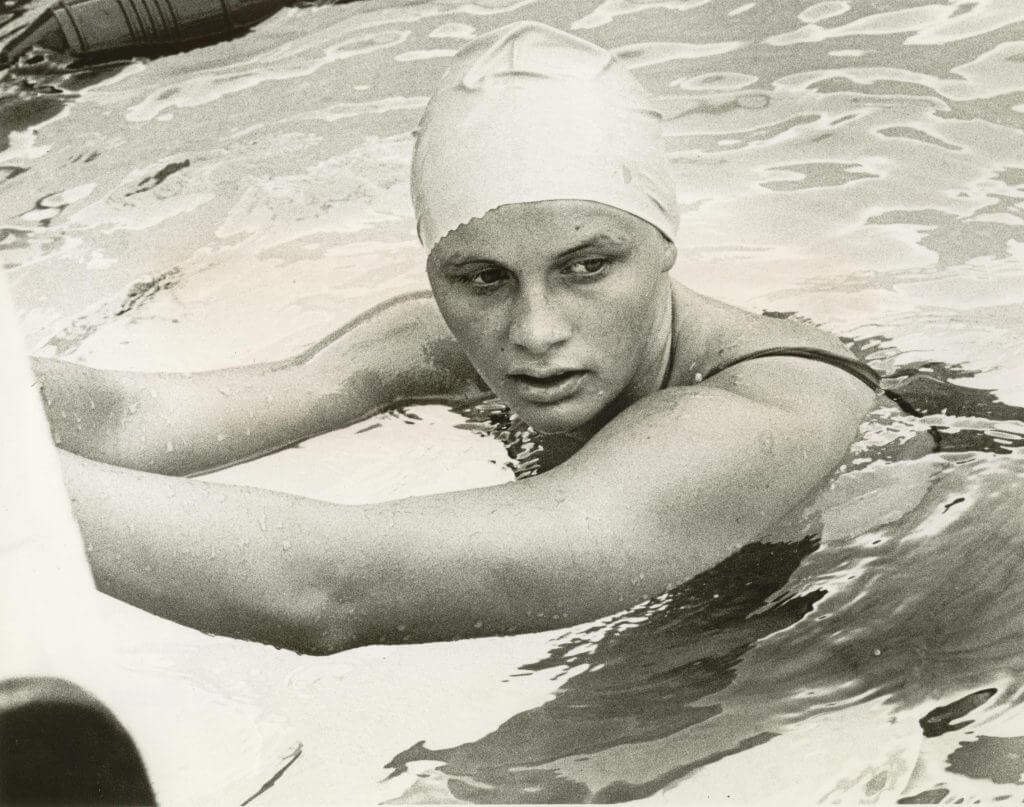Munich Games 50th: Shane Gould Swam Into History in Her Only Olympics

Munich Games 50th: Shane Gould Swam Into History Books in Her Only Olympics
It’s been 50 years since the 1972 Olympic Games in Munich, and Swimming World is celebrating the golden anniversary with several features on the athletes and events from those Games.
Only three times in Olympic history has a swimmer won five individual medals at one Games. Two of those performances were courtesy of Michael Phelps, who won all five of his individual events in 2008 after claiming four golds and one bronze four years earlier, while the other swimmer to reach this lofty mark was a 15-year-old Australian who appeared only once on the Olympic level. Shane Gould had a short career in elite swimming, and she was overshadowed somewhat at the 1972 Olympics by seven-gold-medal-winner Mark Spitz, but what Gould accomplished was utterly unprecedented.
Training under legendary Australian coach Forbes Carlile, Gould broke her first world record in April 1971, when she was just 14, and by the end of the year, she held freestyle world records in the 100, 200, 400, 800 and 1500-meter races. No other swimmer female or male had ever held all those records concurrently, and no other swimmer has since. The next year, Gould would also break the world record in the 200 IM, although she never had six records at once.
At the Munich Olympics, Gould entered as the favorite to win five gold medals. In an interview with Olympics.com, Gould recounted the intense emotions and pride she felt as she sat in the stands watching the Opening Ceremony.
“It was just exciting and emotional to see the world represented through athletes coming together,” she said in the feature. “It’s a lot of pomp and ceremony and nationalism, and the great music that is played really gets to your emotions. The flag-waving and the color and the celebration of life and youth and physical capacities and that people from all around the world can come together and do this, of course that’s what the Olympic Games are most famous for.”
And then the teenager went about making history. There was a world-record setting swim to start it off in the 200 IM, with Gould finishing a half-second ahead of East Germany’s Kornelia Ender. “With the national anthem playing and the flag rising up, the whole electric atmosphere, everyone standing up and the brass band playing, it sent tingles down my spine, and I couldn’t do anything else but cry,” Gould said of that moment in a 2014 video from the International Swimming Hall of Fame.
Gould ended up with a bronze medal in the 100 free behind Americans Sandy Neilson and Shirley Babashoff, but she quickly returned to the top with dominant, world-record-setting swims in the 400 free and 200 free. Finally, it took a world record from American Keena Rothhammer to get the better of Gould in the 800 free.
No, she was not perfect, but unlike almost every other high-medal-count Olympic swimmer, Gould did not have the luxury of swimming with teammates who could help her contend for Olympic medals on relays. No matter.
But then, Gould was done, before even her 16th birthday. After Munich, she never raced at another major competition. Almost 50 years later, Gould reflected on that decision in an interview this March with the Sydney Morning Herald after another Aussie sports star, tennis player Ash Barty, announced her retirement from the sport while seemingly at the peak of her powers.
Barty had just won her third major title by becoming the first Australian women to win the Australian Open in 44 years, and she was ranked No. 1 in the world at the time. While many fans questioned the decision as unconventional, Gould immediately identified with the tennis star.
“We both quit at the peak of our careers. Clearly she believes, just as I did, that there must be other things that might be challenging and interesting to her, and she wants to explore them,” Gould told the Sydney Morning Herald. “I stopped swimming because I realized there are so many other things in the world to explore, like philosophy, religion and environmentalism. They’re all fascinating and you can’t give yourself to them if you are training and competing all the time. It’s as simple as that.”
Gould said she had no regrets about ending her career while still a teenager except “in the way it changed other people’s narratives of me.” But her decision was about her own self, just like Barty’s decision a half-century later. Gould reiterated the key point that sport is not just about entertainment. At its core, the athlete’s own goals and desires matter, nothing else.
“The dominant narrative for elite athletes is that they must keep going and going and going and doing more and more events and entertaining more and more people and continually entertaining people, and earning more money and accumulating fame and notoriety,” Gould said, according to the Herald. But what if your authentic self says you just don’t want to do that? That was my experience, and that is clearly where Ash is at, and good on her.”
So Gould walked away from the sport with her large collection of medals, and it was that single year that cemented her place among the sport’s all-time greats.



